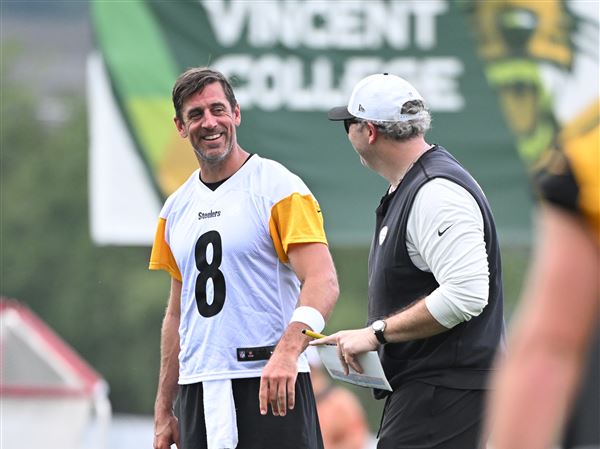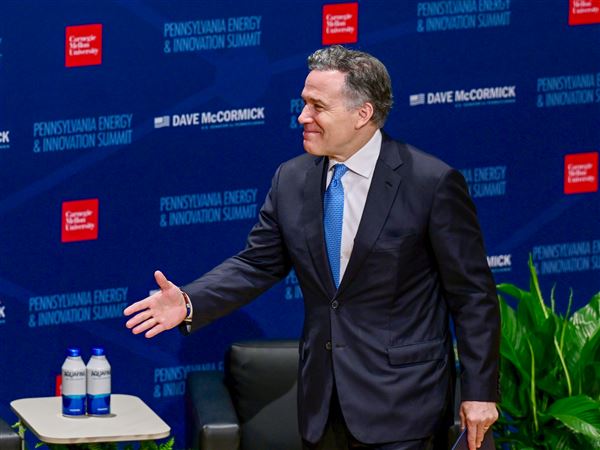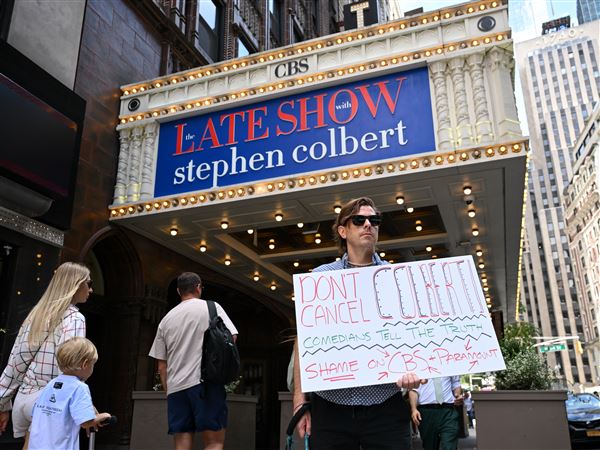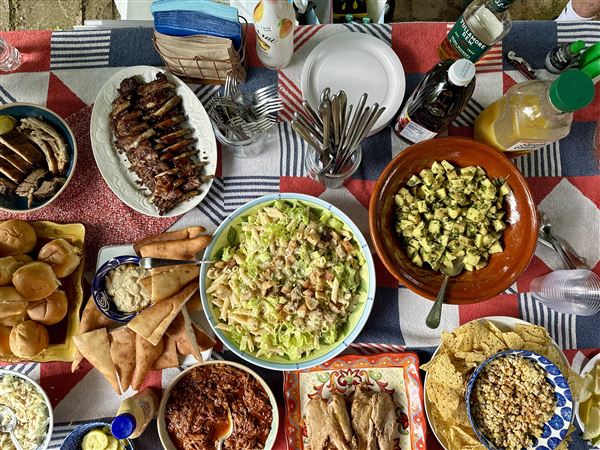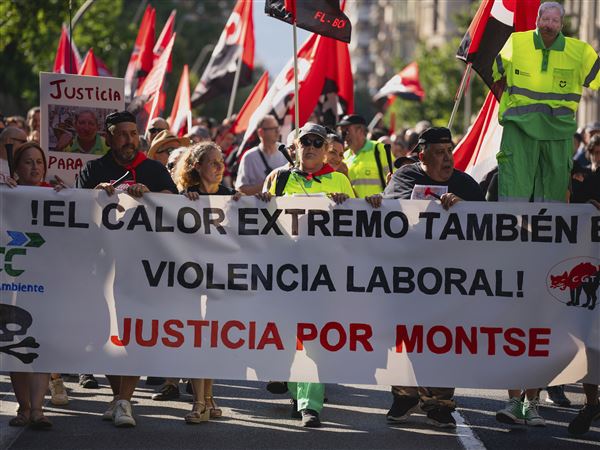Ladies: You've seen this guy before.
For more than 350 years, he has seduced and swashbuckled his way through poetry, art, music and film -- interpreted variously by Moliere, Lord Byron, George Bernard Shaw, Errol Flynn and Johnny Depp -- leaving a trail of broken hearts, furious fiancees and vengeful fathers in his wake.
But the most magisterial and ultimately most chilling iteration of the Don Juan legend has to be Mozart's "Don Giovanni," which comes to the Pittsburgh Opera beginning Saturday, with young singer Michael Todd Simpson playing the lead character -- in a bullring.
While a Spanish bullfight is the perfect place for an alpha male to show his stuff, it's a new approach to Mozart's opera, his greatest opera and perhaps the greatest opera ever, "not just about some silly nobles in Seville, but a universal story," said Pittsburgh Opera general director Christopher Hahn.
The bullring set, constructed for the Pittsburgh Opera in Ambridge, is a stage within a stage, a three-dimensional construct that curves around to a two-dimensional stage flat.
"That setting invites you to look at 'Don Giovanni' as a piece of theater, with the requisite conventions of Baroque theater -- trompe l'oeil, candlelight -- also including the idea of spectators watching the show and participating, too, moving from one space within a space to another," said Justin Way, stage director of the production.
Mr. Way, 42, is resident director at London's Royal Opera House, Covent Garden, but he has also built a reputation as a creative, audacious stage director, mounting dozens of productions for opera companies around the world. The word "boyish enthusiasm" wouldn't be a stretch, but Mr. Way's credentials are solid: He's worked with Franco Zeffirelli and David McVicar and directed the 70th birthday celebration of Stephen Sondheim in New York.
While he and Mr. Hahn wouldn't give away too much about the new staging, it's clear that a strong point of view is at work here. That's as it should be, given the hectic plot, with music written by an Austrian, a libretto in Italian, taking place in an 18th-century bullring in Seville.
Mr. Way understands the pitfalls.
"If you're the person who's going to be responsible for putting a story in front of an audience you'd better have a good idea why it's worth telling that story," he said, "to hit all the points that are important to communicate and translate those points into something an audience is going to viscerally get."
A bullring's vast central space, its corridors, tiered seats, arcades and exit and entrance doors for the bull and the human participants just might be a good fit for Mozart's greatest opera. It was first performed in 1787 in Prague and (here's a fun factoid) that other, real-life Don Juan, Giacomo Casanova, may actually have been in the audience.
"We're setting it in a place where all society meets, and death will occur, and we all know that Don Giovanni begins and ends with a death," Mr. Hahn said.
There also is an "Upstairs/Downstairs" element at play in "Don Giovanni," Mr. Way added.
"Everything about Mozart was about masters and servants so it makes sense," he said.
Mozart was all but an indentured servant, despite his court posting to Emperor Joseph II, the first composer to put characters from all walks of life on stage at the same time.
The legend of Don Juan, "El burlador de Sevilla," was first published in Spain in 1630 by Tirso de Molina. During a visit there a few years ago, Mr. Way began to wonder why Spain was so often the setting of 18th- and 19th-century literature and opera, from the plays of Beaumarchais to "The Barber of Seville" to "Carmen" to "Il Trovatore," "and why are these Europeans who are not Spanish constantly being drawn to Spanish settings?"
Quite simply, geopolitics.
"Spain was a former great, great power -- the most rich, the most powerful in Europe," Mr. Way said, "but it failed to modernize, got stuck in its traditions during the Inquisition, it had rejected the new learning, the new science, it wasn't interested in the Philosophes," those enlightened thinkers, Rousseau, Spinoza, Voltaire.
"It's really impossible not to look at this stuff in view of what's going on in the world at the time," he added, noting that a decade after 1776, and two years before 1789, "there are extraordinary things going on in terms of how society is viewing itself, how the master's double-facedness, a duplicitousness, is revealed to a community and what that does to a society, how it affects them after he is gone."
Bankrupted after repeated wars in the 17th century, Spain, once a great empire, had become the Wild West of Europe, a dangerous, stony landscape where life and death were governed by "an older, more rigid set of rules that aren't modern, aren't moving with the times."
Then, too, years ago, Mr. Way had attended a bullfight in Seville.
"The element of bravery of the actor, the matador, was incredibly exciting, but when I went back and looked at all the photos, I was horrified. In the moment I was totally there and thrilled by it and then I was horrified to look at it play out again."
How did he recover?
"With a good gin and tonic," he laughed.
When he was asked 18 months ago to think about a new "Don Giovanni" for the Pittsburgh Opera, he realized he had the perfect stage set.
"You go into the bullring and you are rooting for this guy, and he's in this suit and facing these giant animals, and then you walk away from it and think, 'Why was I rooting for him?' He was killing the animals. You get both sides of the coin. There's the fact you admire the bravery, achievement, the display the masculinity of this character, but all these qualities you've admired have brought death. It's totally double-sided."
Stagings of this opera have veered wildly in recent years, from singers wearing Jesus T-shirts to sets consisting of giant crumpled pieces of paper. In one version, Don Giovanni spends the opera trying not to die of a wound inflicted by the father of a woman he has just seduced, rather than, at the end, at the hands of the father -- the Commendatore -- who is a ghostly statue.
Visually, at least, this latest version hews to tradition, while posing very modern questions:
"What happens when you kill the father? And not just kill the father but kill God?" asks Mr. Way.
"This is a man who acts as though the next world doesn't exist, as though he's not being judged, so he's in constant debate with the idea that there is a God, just as people at the time questioned the source of the moral order of the universe -- is it actually God, or is it us?
Today, Spain still has its bullrings, where people can choose to sit in the cheap seats in the sun, or opt for the more expensive ones, in the shade, just as they do in this production of "Don Giovanni."
So who chooses to go into the light or into the darkness?
Those who have always loved this opera, and those who have never seen it, need to go and decide for themselves.
First Published: October 31, 2012, 8:00 a.m.


